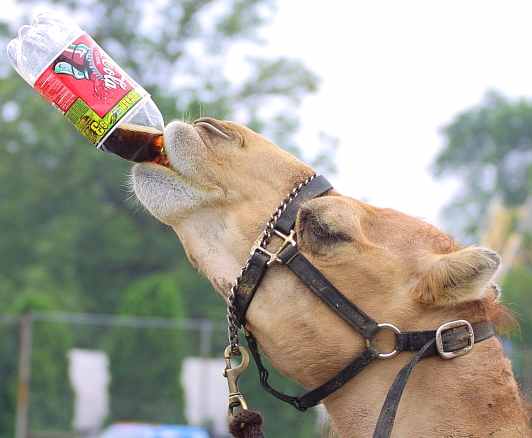 Here's another beverage-related case from Africa: the crisis that Coca-Cola went through in Egypt, in a nutshell.
Here's another beverage-related case from Africa: the crisis that Coca-Cola went through in Egypt, in a nutshell.Coca-Cola has been available in Egypt since 1945 but was then nationalised and produced by government-owned bottling plants until 1994, when the Coca-Cola Bottling Companies of Egypt was formed as a part of the privatisation policy. However, despite its long stay in the country, Coca-Cola has always had a smaller market share than Pepsi in Egypt. Coca-Cola products were identified as symbols of American imperialism, and there was also a general perception in the Arab world that Coca-Cola was for Jews and Pepsi for Arabs.
Since its privatisation, the Coca-Cola Egypt’s PR activities have been focusing on community service and what most would consider a two-way symmetrical philosophy of emphasising feedback through research of relevant publics and recognition that the company must make certain adjustments in its Egyptian operations. Among specific efforts are an employee literacy programme that has produced a 100% literacy rate among its 8,000 workers, and sponsorships and participation with nonprofit projects in the areas of education, health, youth sports, and the environment.
In 2000, Coca-Cola had to face perhaps the most serious accusation any company can endure in an Islamic nation, as a rumour spread through Egypt that Coca-Cola was anti-Islam. An accusation was made that if the Coca-Cola script logo was viewed upside down and in a mirror, it read as “No Mohammed. No Mecca.” This caused outrage and an instant drop in sales of Coca-Cola products of nearly 20%. Literature decrying the company and calls for its ouster from the country circulated in mosques, schools, and on the streets throughout Egypt. In certain jurisdictions, all Coca-Cola signage and advertising was ordered to be removed.
Coca-Cola Egypt’s response to the rumour was immediate, culturally sensitive, and reasoned. They requested to meet with the highest religious figure in the country, Egypt’s Grand Mufti Sheik Nasser Farid Wassel, and also arranged for an official panel of Islamic scholars to consider the matter. The outcome of this was that both the Grand Mufti and the group of scholars ruled there was no substance to the rumour (whose original source was never determined). The Grand Mufti announced this opinion publicly and went on to scold those who were disseminating the rumour for behaviour unbefitting their religion and for risking the jobs and welfare of thousands of Egyptian Muslims employed by Coca-Cola.
Coca-Cola took the step of providing its sales force and delivery truck drivers with copies of Grand Mufti’s statement to display and distribute among businesses and customers. The company also followed up with an advertising campaign that included verses from the Holy Koran, running alongside the recently controversial Coca-Cola logo. Just a few weeks after all this, Coca-Cola regained its prerumour sales level and was once again challenging Pepsi for leadership in the Egyptian soft drink market. By realising the severity of the situation and by working with the religious leaders in a respectful and cooperative manner, Coca-Cola managed to avert serious damage and proclaim their innocence and contribution to Egypt’s economy.
--
Keenan, K. L. Public Relations in Egypt: Practices, Obstacles, and Potentials. In Sriramesh, K. & Verčič, D. (2009) The Global Public Relations Handbook. pp. 179-195.
The thirsty camel from here.




7 comments:
Incredible case Susanna! You have to work hard for your reputation and still the image may not be in your hands. Imagine what kind of things PR specialist have to consider and tackle in order to manage the cross cultural public relations.
PR gets more and more difficult in globalizing world!
You are right, if we want to or not today's world is globalizing. What do you guys think PR has to do to survive these days?
Jitske
wow, what a weird story... but I think the campaign they launched after the rumours with using Koran-verses is also very risky. This can also backfire to you...
Maria
This is a good story because I wrote about Coca-Cola's difficulties in India. But the case was much worse than this, and it didn't end up well. But it is good to know that in similar cases the same company is able to overcame the crisis.
I agree with Maria: the Koran verses might be a bit risky. But if handled respectfully, well, I must admit Coca-Cola seems to have done a good job in their PR.
A case like this shows the importance of patience and calmness in the face of image problems. Coca-Cola seems to have made a wise move in respectfully asking for the opinion and support of religious experts, which apparently lead to satisfactory results and truth being heard in this case. Shows that subtle and polite gestures can sometimes get you further than loud cries and demands.
Tuomas
Great case! But I'd put it this way - isn't it an easy environment for corporate PR, if you have to convince just one important stakeholder, which in turn gives you legitimation to operate in that environment? Think about some scandal from a fuzzy rumor in the USA. Would everyone believe it, if Obama or some other guy would say that the corporation is ok?
Post a Comment